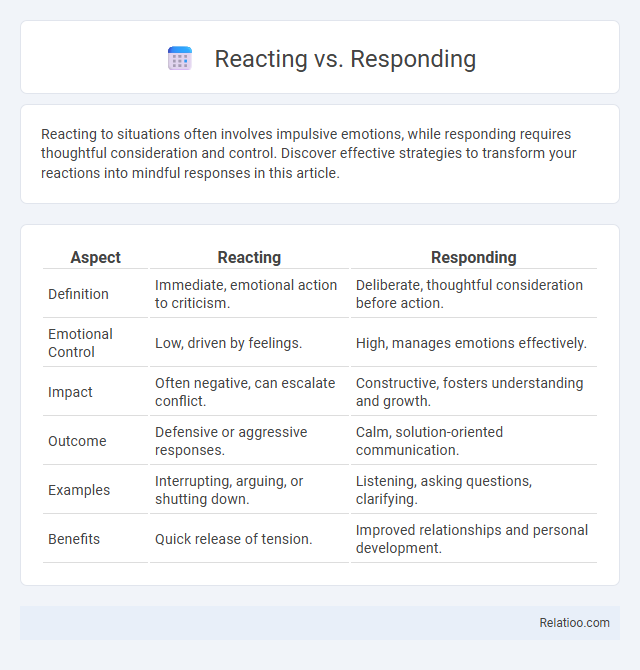Reacting to situations often involves impulsive emotions, while responding requires thoughtful consideration and control. Discover effective strategies to transform your reactions into mindful responses in this article.
Table of Comparison
| Aspect | Reacting | Responding |
|---|---|---|
| Definition | Immediate, emotional action to criticism. | Deliberate, thoughtful consideration before action. |
| Emotional Control | Low, driven by feelings. | High, manages emotions effectively. |
| Impact | Often negative, can escalate conflict. | Constructive, fosters understanding and growth. |
| Outcome | Defensive or aggressive responses. | Calm, solution-oriented communication. |
| Examples | Interrupting, arguing, or shutting down. | Listening, asking questions, clarifying. |
| Benefits | Quick release of tension. | Improved relationships and personal development. |
Understanding Reacting vs Responding
Understanding reacting versus responding involves recognizing that reacting typically refers to immediate, automatic, and often emotional actions triggered by external stimuli, whereas responding implies a more thoughtful, deliberate action based on reflection and control. Reacting can be impulsive and driven by emotional reactivity, which may lead to less optimal outcomes, while responding allows for emotional regulation and intentional decision-making. Developing the ability to respond rather than react enhances emotional intelligence and promotes healthier interpersonal interactions.
The Psychology Behind Reactions and Responses
The psychology behind reactions and responses involves understanding the brain's automatic versus controlled processes, where reacting is driven by the amygdala's immediate emotional impulses, and responding engages the prefrontal cortex's rational evaluation. Emotional reactivity reflects an individual's threshold for emotional stimuli, influenced by factors like temperament, stress levels, and neurochemical balance. Effective emotional regulation hinges on recognizing these psychological mechanisms to shift from impulsive reactions toward thoughtful, adaptive responses.
Emotional Triggers: Recognizing Your Patterns
Emotional triggers activate automatic reactions that bypass rational thinking, causing you to react instinctively rather than respond thoughtfully. Recognizing your patterns involves identifying specific situations, words, or behaviors that provoke intense emotional responses, which helps in managing your emotional reactivity. Understanding these triggers empowers you to pause, process emotions, and choose a healthier, more controlled response.
The Impact of Reacting on Relationships
Reacting impulsively in relationships often escalates conflicts and erodes trust by triggering defensive behaviors and miscommunications. Emotional reactivity can lead to misunderstandings, creating distance and diminishing emotional intimacy between partners. Responding thoughtfully, contrasted with reacting, fosters empathy and constructive dialogue, strengthening connection and mutual respect.
Benefits of Mindful Responding
Mindful responding cultivates emotional regulation by allowing individuals to pause and evaluate their reactions before acting, reducing impulsivity and stress. This practice enhances interpersonal communication, fostering empathy and understanding through deliberate, thoughtful interactions. By promoting awareness and presence, mindful responding supports mental clarity and resilience, improving overall emotional well-being.
Techniques to Shift from Reacting to Responding
Shifting from reacting to responding involves cultivating mindfulness to recognize emotional triggers before they escalate. Techniques such as deep breathing, pausing to assess the situation, and practicing reflective listening enable conscious, deliberate choices rather than impulsive reactions. Cognitive-behavioral strategies and emotional regulation exercises enhance self-awareness, allowing individuals to manage emotional reactivity and respond with greater clarity and control.
The Role of Self-Awareness in Communication
Self-awareness plays a crucial role in distinguishing reacting, responding, and emotional reactivity within communication by enabling individuals to recognize their emotional triggers and choose thoughtful responses over impulsive reactions. High self-awareness fosters emotional regulation, allowing communicators to engage in active listening and empathetic dialogue, reducing misunderstandings and conflict escalation. Developing this skill enhances interpersonal effectiveness and promotes healthier, more constructive exchanges in both personal and professional settings.
Practical Examples: Reacting vs Responding in Daily Life
Reacting involves impulsive actions driven by immediate emotions, such as snapping at a colleague during a stressful meeting, while responding requires thoughtful consideration, like calmly addressing the issue after taking a moment to breathe. Emotional reactivity often leads to regretful decisions, whereas your ability to respond enables better conflict resolution and stress management. Practicing mindful pauses before engaging helps transform reactive tendencies into constructive responses in daily interactions.
Tools and Practices for Emotional Regulation
Effective tools for emotional regulation include mindfulness meditation, cognitive reframing, and deep-breathing exercises, which help shift automatic reactions to deliberate responses. Practices such as journaling and emotional labeling enhance self-awareness, reducing impulsive emotional reactivity by promoting thoughtful reflection. Consistent engagement in these techniques strengthens prefrontal cortex function, improving one's ability to manage emotions and respond adaptively under stress.
Cultivating a Responding Mindset for Personal Growth
Cultivating a responding mindset involves shifting from automatic emotional reactivity to conscious, thoughtful reactions, which fosters personal growth by enhancing emotional regulation and decision-making. Responding mindfully allows for greater self-awareness and resilience, reducing impulsive behaviors driven by stress or triggers. Developing this skill can improve relationships, increase emotional intelligence, and support long-term psychological well-being.

Infographic: Reacting vs Responding
 relatioo.com
relatioo.com